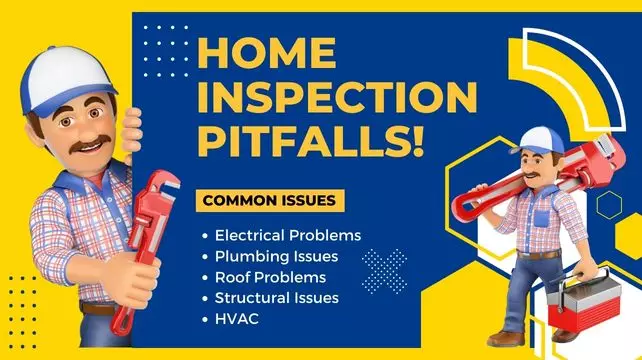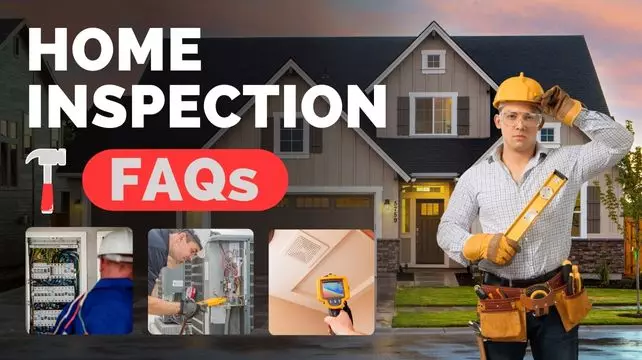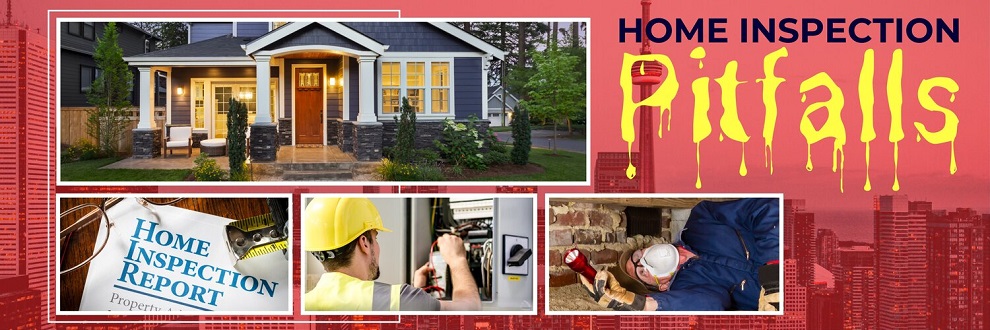11 High Cost Inspection Traps You Should Know About Weeks Before Buying / Listing Your Home For Sale! 

Mastering the Home Inspection Process: 11 Essential Tips for Homebuyers in Toronto
Preparing for a Home Inspection can be nerve wracking, especially if you're unsure what to expect.
According to industry experts, there are over 33 physical problems that will come under scrutiny during a Home Inspection when your home is for sale.
A new report has been prepared which identifies the most common of these problems, and what you should know about them before you list your home for sale.
Whether you own an old home or a brand new one, there are a number of things that can fall short of requirements during a home inspection. If not identified and dealt with, any of these 11 items could cost you dearly in terms of repair. That's why it's critical that you read this report before you list your home. If you wait until the building inspector flags these issues for you, you will almost certainly experience costly delays in the close of your home sale or, worse, turn prospective buyers away altogether.
In most cases, you can make a reasonable pre-inspection yourself if you know what you're looking for. And knowing what you're looking for can help you prevent little problems from growing into costly and unmanageable ones.
To help homesellers deal with this issue before their home is listed, a FREE report entitled
"11 Things You Need to Know to Pass Your Home Inspection",
has been compiled which explains the issues involved. Order this report NOW to learn how to ensure a home inspection doesn't cost you the sale of your home.

What is Home Inspection and why it is important when Buying or Selling a Property?
A home inspection is a critical step in the home buying and selling process. It is an examination of the property's physical condition, from the roof to the foundation. A home inspection is usually conducted by a licensed and certified inspector who has expertise in evaluating the structural, mechanical, and electrical systems of a property.
For buyers, a home inspection provides a comprehensive report on the condition of the property, highlighting any major or minor issues that may require repair or maintenance. This information helps buyers make informed decisions about their purchase, negotiate better deals, and budget for any potential repair costs.
For sellers, getting a pre-listing home inspection can help identify any issues beforehand, allowing them to fix any problems and make necessary repairs or adjustments. This can help the property sell faster and for a higher price, as buyers will have more confidence in the condition of the property.
Overall, a home inspection is a critical step in the home buying and selling process. It helps ensure that both parties have a clear understanding of the property's condition, leading to fair and successful transactions.

What are some of the common issues found during a Home Inspection?
During a home inspection, a licensed and certified inspector will evaluate the property's physical condition and identify any issues that require attention. Some common issues found during a home inspection include:
-
Electrical problems: This includes outdated wiring, improperly installed electrical fixtures, and circuit overload issues.
-
Plumbing issues: This includes leaky pipes, damaged sewage systems, and poor water pressure.
-
Roof problems: This includes damaged shingles, poor flashing, and leaks.
-
Structural issues: This includes problems with the foundation, walls, and framing.
-
Heating and cooling system problems: This includes issues with the furnace, air conditioning unit, and ventilation systems.
-
Insulation problems: This includes poor insulation, improperly installed insulation, and air leaks.
-
Pest and insect infestations: This includes problems with termites, rodents, and other pests.
-
Water damage: This includes issues with water intrusion, mold growth, and water stains.
-
Safety hazards: This includes problems with carbon monoxide detectors, radon levels, and fire safety.
By identifying these issues, a home inspection report helps buyers make informed decisions about their purchase and helps sellers address any issues before listing the property for sale.

How long does a Home Inspection typically take and what is involved in the process?
The length of a home inspection can vary depending on the size and condition of the property being inspected. On average, a home inspection can take between 2 to 4 hours to complete. Larger or more complex homes may take longer.
During a home inspection, a licensed and certified inspector will evaluate the physical condition of the property and identify any issues that require attention. The inspection typically includes a visual evaluation of the following areas:
-
Structural components: The inspector will evaluate the foundation, roof, walls, and framing of the property.
-
Electrical systems: The inspector will check the electrical panel, wiring, and outlets for any issues.
-
Plumbing systems: The inspector will check the water supply and drainage systems, as well as fixtures and faucets.
-
HVAC systems: The inspector will check the heating, ventilation, and air conditioning systems for proper operation.
-
Appliances: The inspector will check any included appliances, such as the stove, dishwasher, and refrigerator.
-
Interior and exterior finishes: The inspector will check for any damage or defects in the walls, flooring, and windows.
-
Attic and crawlspace: The inspector will evaluate the insulation, ventilation, and structural components of these areas.
After the inspection is complete, the inspector will provide a detailed report outlining any issues found during the inspection. This report can be used by buyers to negotiate repairs or ask for a reduction in the purchase price, and by sellers to address any issues before listing the property for sale.

Who pays for the Home Inspection, the Buyer or the Seller?
Typically, the buyer is responsible for paying for the home inspection. This is because the inspection is done for the benefit of the buyer, to ensure they are fully aware of the condition of the property they are considering purchasing. However, in some cases, sellers may choose to have a pre-listing inspection done to identify any potential issues that could affect the sale of their home. In this case, the seller would be responsible for paying for the inspection.Ultimately, who pays for the inspection is negotiable and can be included in the terms of the purchase agreement.

What are some tips for selecting a reputable and qualified Home Inspector?
Here are some tips for selecting a reputable and qualified Home Inspector:
-
Look for a licensed and insured inspector: Make sure the Home Inspector you choose is licensed and insured in your state or province. This ensures that they have met the necessary requirements to perform home inspections in your area.
-
Check their credentials: Look for an inspector who has relevant qualifications, such as membership in a professional organization like the Canadian Association of Home and Property Inspectors (CAHPI).
-
Look for experience: It is important to choose an inspector who has experience in the type of property you are considering purchasing. For example, if you are buying an older home, look for an inspector who has experience inspecting older homes.
-
Ask for references: Ask the inspector for references from previous clients. This will give you an idea of their experience and whether they are reliable and trustworthy.
-
Inquire about their inspection process: Find out what the inspector will be checking during the inspection, and what is included in the report. A good inspector should inspect all major systems in the home and provide a detailed report that includes photos and descriptions of any issues found.
-
Consider their communication skills: Choose an inspector who is able to explain complex issues in a clear and understandable manner. You should feel comfortable asking questions and discussing any concerns you have with the inspector.
By taking the time to choose a reputable and qualified Home Inspector, you can ensure that you receive a thorough and accurate inspection of the property you are considering purchasing.

How does a Home Inspection impact the negotiation process between the Buyer and Seller?
A Home Inspection can have a significant impact on the negotiation process between the Buyer and Seller. If significant issues are found during the inspection, the Buyer may ask for repairs or a credit to cover the cost of repairs. The Seller may agree to make the repairs, negotiate a lower sale price, or refuse to make any changes.Alternatively, the Buyer may decide to walk away from the sale altogether if the issues found are too significant or costly. It is important for both parties to communicate openly and negotiate in good faith to come to a mutually acceptable solution.

What happens if significant issues are found during the Home Inspection?
If significant issues are found during a Home Inspection, the Buyer may choose to negotiate with the Seller to have repairs made before the sale, or they may ask for a credit towards the cost of the repairs. The Seller may agree to make the repairs or offer a credit, or they may choose to renegotiate the sale price. If an agreement cannot be reached, the Buyer may have the option to walk away from the sale altogether.
In some cases, the Seller may choose to make repairs or provide a credit for a portion of the repairs to move the sale forward, while in other cases, the Seller may refuse to make any changes, in which case the Buyer must decide whether to continue with the sale as is or walk away. It is important to have clear communication and to negotiate in good faith to reach a mutually acceptable solution for both parties.

Can a Home Inspection be waived or skipped?
Yes, a Home Inspection can be waived or skipped, but it is generally not recommended. Skipping a Home Inspection can be a risky decision for both the buyer and the seller. The buyer may not be aware of any potential issues or defects with the property, which could end up being costly to repair or could affect the value of the home.Additionally, waiving a Home Inspection could make it more difficult for the buyer to negotiate with the seller on price or repairs. On the other hand, the seller may be at risk of legal action if they are aware of any issues and fail to disclose them to the buyer. Overall, it is in the best interest of both parties to have a thorough Home Inspection conducted.

What should Buyers and Sellers expect during the Home Inspection?
During a Home Inspection, buyers and sellers can expect a thorough evaluation of the property's overall condition. The home inspector will assess the major systems of the home, including the roof, foundation, electrical, plumbing, heating and cooling, and more. They will also check for any signs of moisture or water damage, as well as potential safety hazards.As the inspection progresses, the inspector will provide feedback to the buyers and sellers about any issues they uncover, along with recommendations for repairs or further evaluation. Overall, the goal of the Home Inspection is to provide a comprehensive understanding of the condition of the property, so that buyers and sellers can make informed decisions about the transaction.

-
Question: Can you recommend any specific steps or preparations homeowners should take before the home inspection?
Answer: Prior to the home inspection, homeowners can ensure that all areas of the property are accessible, including utility rooms, crawl spaces, and attic spaces. It's also helpful to declutter and remove any personal belongings that may hinder the inspection process. -
Question: Are there any specific red flags or warning signs that buyers should look out for during a home inspection?
Answer: Buyers should pay attention to signs of water damage, such as stains on ceilings or walls, musty odors, or damp areas. Electrical issues, such as flickering lights or outdated wiring, should also be noted. Structural issues, such as cracks in the foundation or sagging floors, are important to identify as well. -
Question: Can a home inspection help uncover potential health and safety concerns?
Answer: Absolutely. A thorough home inspection can identify safety hazards, such as faulty wiring, mold or asbestos presence, inadequate ventilation, or issues with the HVAC system. These findings are crucial for the buyer's well-being and can help them make informed decisions. -
Question: Are there any limitations to what a home inspector can assess or identify?
Answer: While home inspectors are trained to examine various aspects of a property, there are limitations to their scope. They typically focus on visible and accessible areas and may not inspect concealed or inaccessible parts of the property, such as inside walls or beneath the foundation. -
Question: How soon after the home inspection will I receive the inspection report?
Answer: The timing may vary, but typically you can expect to receive the inspection report within a few days after the inspection. The report provides a detailed summary of the inspector's findings, including any issues or concerns identified during the inspection. -
Question: What should I do if the home inspection report reveals major issues with the property?
Answer: If major issues are identified in the inspection report, it's advisable to consult with a real estate professional and possibly negotiate with the seller to address the concerns. Depending on the severity of the issues, you may also consider seeking professional opinions or estimates for repairs or replacements. -
Question: Can a home inspector provide estimates for the cost of repairs or replacements?
Answer: While a home inspector can provide insights into the condition of various components of the property, they generally do not provide estimates for the cost of repairs or replacements. It's recommended to consult with specialized contractors or professionals for accurate cost estimates. -
Question: Are there any specialized inspections or additional assessments that I should consider for certain types of properties?
Answer: Depending on the property's specific features or location, additional inspections or assessments may be necessary. For example, older homes may benefit from a separate electrical or plumbing inspection, and properties in high-risk areas may require a comprehensive environmental assessment. -
Question: What are some common mistakes or oversights that homebuyers make during the home inspection process?
Answer: One common mistake is overlooking minor issues while focusing only on major concerns. It's important to consider the overall condition of the property and understand that no house is perfect. Additionally, failing to review and understand the inspection report thoroughly can lead to missed opportunities for negotiation or further investigation. -
Question: How can I ensure that the home inspection is thorough and comprehensive?
Answer: To ensure a thorough and comprehensive home inspection, it's crucial to hire a qualified and experienced home inspector. Research their credentials, ask for references, and consider their reputation in the industry. Communicate your expectations clearly and be present during the inspection to address any questions or concerns you may have.
Remember, these answers provide general guidance, and it's essential to consult with a qualified home inspector or real estate professional for accurate and specific information based on your unique circumstances and the local real estate market. Their expertise will help you navigate the home inspection process effectively and make informed decisions regarding the purchase of a property. By being proactive, asking relevant questions, and seeking professional guidance, you can ensure that your home inspection is thorough, informative, and contributes to a successful home buying experience.
Act Now: "11 Things You Need to Know to Pass Your Home Inspection".
 Order this FREE Report NOW to learn how to ensure a Home Inspection doesn't cost you the Sale of your Home!
Order this FREE Report NOW to learn how to ensure a Home Inspection doesn't cost you the Sale of your Home!

